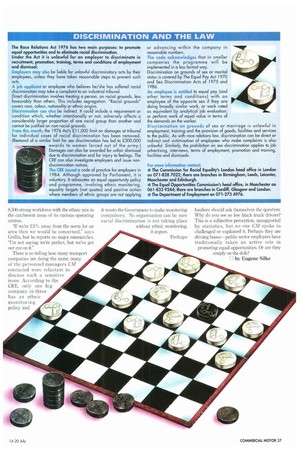DISCRIMINATION AND THE LAW
Page 39

If you've noticed an error in this article please click here to report it so we can fix it.
The Race Relations Act 1976 has two main purposes: to promote equal opportunities and to eliminate racial discrimination.
Under the Act it is unlawful for an employer to discriminate in recruitment, promotion, training, terms and conditions of employment and dismissal.
Employers may also be liable for unlawful discriminatory acts by their employees, unless they have taken reasonable steps to prevent such
acts.
A job applicant or employee who believes he/she has suffered racial discrimination may take a complaint to an industrial tribunal. Direct discrimination involves treating a person, on racial grounds, less favourably than others. This includes segregation. "Racial grounds" covers race, colour, nationality or ethnic origins. Discrimination can also be indirect. It could include a requirement or condition which, whether intentionally or not, adversely effects a considerably larger proportion of one racial group than another and cannot be justified on non-racial grounds.
From this month, the 1976 Ad's El I ,000 limit on damages at tribunal for individual cases of racial discrimination has been removed, (Removal oF a similar limit for sex discrimination has led to £300,000 awards to women forced out of the army.) Damages can also be awarded for unfair dismissal due to discrimination and for injury to feelings. The CRE can also investigate employers and issue nondiscrimination notices.
The CRE issued a code of practice for employers in 1964. Although approved by Parliament, it is voluntary. it advocates an equal opportunity policy and programme, involving ethnic monitoring, equality targets (not quotas) and positive action where members of ethnic groups are not applying or advancing within the company in reasonable numbers.
The code acknowledges that in smaller companies the programme will be implemented in a less formal way. Discrimination on grounds of sex or marital status is covered by The Equal Pay Act 1970 and Sex Discrimination Acts of 1975 and 1986, An employee is entitled to equal pay (and other terms and conditions) with an employee of the opposite sex if they are doing broadly similar work, or work rated as equivalent by analytical job evaluation; or perform work of equal value in terms of the demands on the worker.
Discrimination on grounds of sex or marriage is unlawful in employment, training and the provision of goods, facilities and services to the public. As with race relations law, discrimination can be direct or indirect and victimisation of employees who make complaints is also unlawful. Similarly, the prohibition on sex discrimination applies to job advertising, interviews, terms of employment, promotion and training, facilities and dismissals.
For more information contact: • The Commission for Racial Equality's London head office in London on 071-828 7022; there are branches in Birmingham, Leeds, Leicester, Manchester and Edinburgh. • The Equal Opportunities Commission's head office, in Manchester on 061-833 9244; there are branches in Cardiff, Glasgow and London.
• The Deportment of Employment on 071-273 4976.




























































































